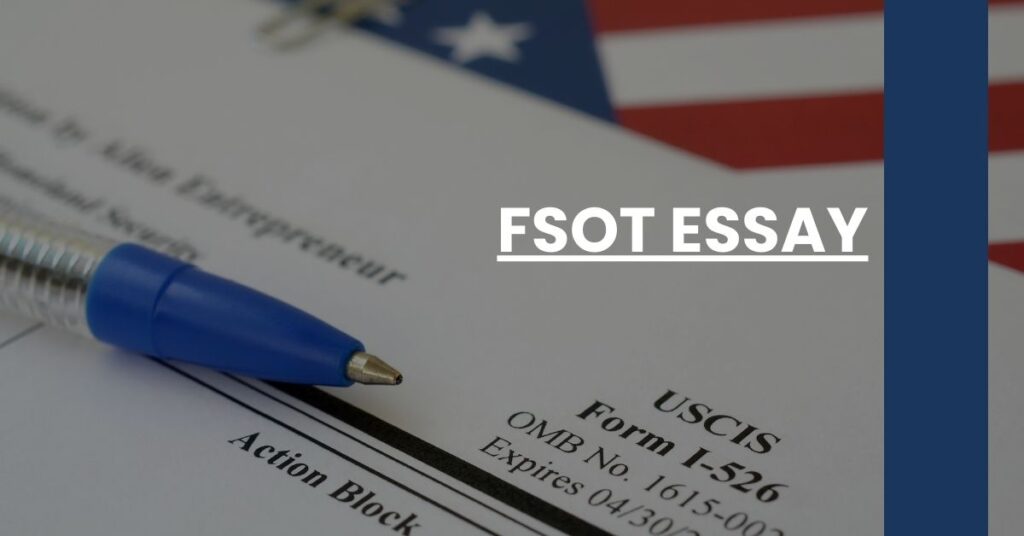Navigating the FSOT essay can be the difference in elevating your diplomatic career aspirations.
- Mastering the FSOT Essay Structure: Secrets to crafting a compelling and structured response.
- Understanding FSOT Essay Topics: Get familiar with common themes to anticipate and prepare effectively.
- Improving FSOT Essay Writing: Tips for clearer, impactful, and persuasive essays.
Ace your FSOT essay and move closer to joining the ranks of Foreign Service Officers.
- Understanding the FSOT Essay Section
- Essential Components of a Successful FSOT Essay
- Common Themes and Topics in FSOT Essays
- Effective Preparation Strategies for the FSOT Essay
- Writing Techniques to Improve Your FSOT Essay
- Time Management Tips for the FSOT Essay
- Grading Criteria and Scoring for the FSOT Essay
- Sample FSOT Essay Prompts and Responses
- Conclusion: Your Pathway to Becoming a Foreign Service Officer
Understanding the FSOT Essay Section
The essay section of the Foreign Service Officer Test (FSOT) is more than just a writing exercise; it’s a vital component that gauges your ability to articulate complex ideas with clarity and precision—qualities essential for a career in the U.S. Department of State. As a prospective diplomat, you will need to demonstrate that you can construct a thoughtful and persuasive analysis on a variety of subjects within the tight timeframe of the FSOT essay.
What Does the FSOT Essay Entail?
The FSOT essay demands that you exhibit supreme control over language and structure. You will be given 30 minutes to craft an essay of 400-700 words on one of three provided topics. These topics often touch upon subjects significant to foreign service work, such as current events, economics, and diplomatic policies.
Why Is the Essay Important?
This isn’t just another box to tick on your FSOT checklist; your essay is a unique chance to showcase your written communication skills—a chance to underline your readiness for the challenging communication demands that define the work of a Foreign Service Officer.
Essential Components of a Successful FSOT Essay
To convey your points effectively in the FSOT essay, there are a few critical components you’ll want to include:
- Clear Thesis Statement: Begin with a compelling thesis to guide your entire essay. It should be specific and assert the stance you’re taking.
- Logical Structure: This includes an introduction, body paragraphs with supporting evidence, and a well-rounded conclusion.
- Quality Content: Go beyond just stating facts. Analyze them, and offer insights that showcase your ability to think critically about global issues.
- Style and Cohesion: Transitions between sentences and paragraphs should be smooth, maintaining the flow of your argument.
Making Your Essay Stand Out
Remember, evaluators are looking for a demonstration of your potential to fulfill the role of an articulate and analytical diplomat. Thus, structuring your essay with a balanced argument and weaving it with a narrative flow can make your narrative stand out.
Common Themes and Topics in FSOT Essays
Anticipating the themes you might encounter can give you a leg up in crafting a strong essay. The FSOT may challenge you with prompts on:
- Global politics and international relations
- Economic development and resource management
- Cultural understanding and diplomatic communication
- Crisis management and resolution strategies
Active Engagement with Current Affairs
Stay informed about global news and events. This doesn’t just enrich your store of potential examples; it ensures your essay reflects an understanding of the world as it is today.
Effective Preparation Strategies for the FSOT Essay
To reach the apex of your essay-writing abilities before the exam, immerse yourself in a thorough preparation regime:
- Expand Your Knowledge Base: Engage with various news sources, policy analysis, and cultural studies. Your aim should be to build a versatile mental library to pull from during the exam.
- Practice Persuasive Writing: Hone your ability to argue a point convincingly, using evidence and logical reasoning. Sites like FSOT Simulator enable you to practice in conditions similar to the actual test.
- Simulate Exam Conditions: Time management is crucial. Practice writing complete essays within the 30-minute time frame to build speed and confidence.
- Seek Feedback: If possible, have your practice essays reviewed by peers or mentors. Constructive criticism can significantly improve the quality of your writing.
Resources to Refine Your Skills
There are marvelous online resources at your fingertips! Take advantage of tools like FSOT Prep’s practice tests and essay prompts, which can bolster your preparatory efforts and ensure you walk into the FSOT essay section with poise and preparedness.
Writing Techniques to Improve Your FSOT Essay
Crafting an FSOT essay that resonates with examiners requires skillful writing. Here are techniques to enhance the quality of your essay:
Focus on Clarity and Concision
- Be Direct: Your thesis and topic sentences should clearly present your arguments. Avoid verbosity and ensure each sentence conveys a unique point.
- Active Voice: Opt for the active voice to make your sentences more dynamic and direct.
Develop Your Argument Coherently
- Logical Flow: Arrange your points logically, leading the reader through your argument in a manner that feels natural and compelling.
- Transitional Phrases: Use phrases like “however,” “moreover,” and “therefore” to guide the reader seamlessly from one idea to the next.
Hone Persuasion Techniques
- Appeal to Logos: Use data and well-reasoned analysis to support your points.
- Pathos: Engage the reader emotionally by connecting your argument to human stories or ethical dilemmas.
- Ethos: Establish your credibility by referencing reputable sources and demonstrating an understanding of the topic.
Refine Language and Tone
- Word Choice: Opt for precise, vivid language instead of generic terms to convey your message powerfully.
- Professional Tone: Keep your tone formal and academic, as befits an aspiring diplomat.
Crafting an excellent FSOT essay means marrying content with clarity, logic with persuasiveness, and argumentation with impeccable language.
Time Management Tips for the FSOT Essay
Managing your time effectively can make a monumental difference in the comprehensiveness and quality of your FSOT essay.
Understand the Structure of Your Time
- Planning (5 minutes): Outline your essay. Note down your thesis, key arguments, and examples.
- Writing (20 minutes): Execute your plan. Stick to your outline to keep on track.
- Revision (5 minutes): Scan for errors and refine your language for maximum impact.
Practice Timed Essays
Regular practice under timed conditions can sharpen your ability to think and write quickly. Consider using timed essay exercises to simulate the FSOT conditions.
Prioritize Your Points
- Essential Arguments: Lead with your strongest points. If time runs short, you’ve already made your best case.
- Supporting Details: Only delve into supporting details if time allows.
Effective time management can transform a rushed and disorganized attempt into a polished and persuasive FSOT essay.
Grading Criteria and Scoring for the FSOT Essay
Understanding how your FSOT essay is graded can illuminate the areas where you need to shine.
Breakdown of Grading Criteria
- Content and Analysis: Your insights into the topic and the depth of your argument.
- Organization: A logical progression from introduction to conclusion.
- Language Use: Grammar, vocabulary, and sentence variety.
Minimum Scoring Requirements
To have your essay evaluated, you must first meet a minimum score on the multiple-choice sections. Once there, aim for an essay score that reflects your true potential as a Foreign Service Officer.
Scoring well on your FSOT essay involves tailoring your writing to these grading emphases, distinguishing you as a well-prepared candidate.
Sample FSOT Essay Prompts and Responses
Delving into sample FSOT essay prompts and model responses can be instrumental in visualizing the standard expected.
Analyze and Learn from Examples
Examine successful essays and:
- Dissect Their Structure: Understand how they frame their argument.
- Note Persuasive Elements: Identify the techniques that make the argument compelling.
- Evaluate Language Use: Observe the diction and syntax that give the essay sophistication.
Create Your Own Responses
Practice by responding to sample prompts, then compare your work to high-scoring essays. This reflection can guide improvements in your own writing ability.
Understanding the nuances of high-caliber FSOT essays through analysis and practice prepares you to tackle any topic that comes your way.
Conclusion: Your Pathway to Becoming a Foreign Service Officer
Approaching your FSOT essay with a strategic mindset is crucial. It’s about showcasing your knowledge, structured thinking, and eloquence—skills indicative of a future Foreign Service Officer. Remember, preparation is paramount: familiarize yourself with the essay structure, perform timed practices, and immerse yourself in diverse topics to ensure your mind is ripe with insights and examples.
As you ready yourself for the FSOT essay, let the wealth of current events, historical precedents, and policy debates be your canvas for demonstrating the depth of your understanding and the agility of your intellect.
Now, with these insights and techniques, you are better poised to concisely and convincingly convey the complexities of your thoughts through your writing. This FSOT essay is not just a test of your knowledge; it’s an opportunity to exhibit the qualities of a diplomat in the making. Good luck, and may your words pave your path to a noble career in the Foreign Service.
Master FSOT essay techniques to ace the Foreign Service Officer Test with our expert strategies and writing tips.

